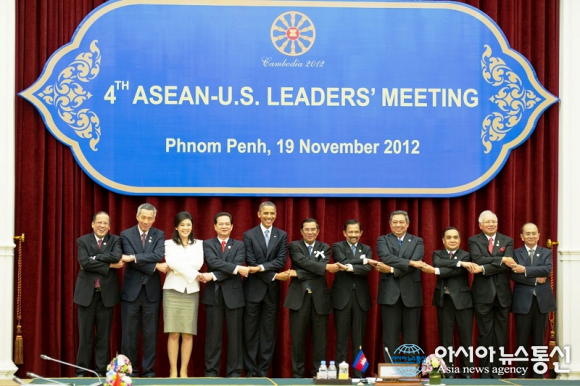 |
| Photo By: U.S. Department of State / Flickr |
Pan-Asianism is defined as an extensive scope of ideas and movements geared towards the solidarity of Asian peoples to reverse Western influences in the late 19th and early 20th centuries.
Originally a concept hailing from Japan, Pan-Asianism has undergone many forms, and one of these forms was the so-called Pan-Southeast Asianism.
One of Pan-Southeast Asianism's ideals is the establishment of a Southeast Asian Community, a framework that is being provided by ASEAN, an organization that is celebrating five decades of promoting Pan-Asianism, intergovernmental cooperation, and economic, political, military, educational and cultural integration amongst its members and Asian states.
This year, the Philippines will host the ASEAN Summit for the third time.
The Genesis
On August 8, 1967, Foreign Ministers Adam Malik (Indonesia), Narciso R. Ramos (Philippines), Tun Abdul Razak (Malaysia), S. Rajaratnam (Singapore), and Thanat Khoman (Thailand) have signed the ASEAN Declaration, which is the catalyst behind the establishment of the Association of Southeast Asian Nations (ASEAN).
Based on the document, ASEAN was geared towards:
- acceleration of economic growth, social progress, and cultural development in the region.
- promotion of regional peace and stability
- collaboration and mutual assistance on issues of common interest
- assistance via training and research facilities
- collaboration for the better use of agriculture and industry to uplift the people's living standards
- promotion of Southeast Asian studies, and
- sustenance of close and beneficial cooperation with existing international organizations with the same goals and purposes
The shared fear of communism and hunger for economic progress were the main catalysts behind ASEAN's establishment.
ASEAN is widely known for their various foreign affairs and summits, and among these summits was the so-called ASEAN Summit.
A History of Gatherings
February 1976 saw the inaugural ASEAN Summit in Bali. ASEAN's expression of its readiness to "develop fruitful relations" and the ASEAN leaders' signing of the Treaty of Amity and Cooperation in Southeast Asia were the summit's highlights.
A year later, the Summit was held in Kuala Lumpur, Malaysia, and it was in this Summit that Japan and ASEAN met for the first time. Here, Japan relayed its desire to promote cooperation with the organization.
The 9th ASEAN Summit in Bali, Indonesia on October 7, 2003, saw the signing of a declaration called the "Bali Concord II" where they agreed to aim for closer economic integration by 2020.
The declaration states that "an ASEAN Community" would be set upon three pillars, "namely political and security cooperation, economic cooperation, and socio-cultural cooperation; for the purpose of ensuring durable peace, stability and shared prosperity in the region."
It was also at the same summit that the People's Republic of China and ASEAN have agreed to work faster for a mutual trade agreement, that will establish the world's most populous market, featuring 1.7 billion consumers.
Japan also signed an agreement that promises to decrease tariff and non-tariff barriers with ASEAN members.
On the 11th ASEAN summit, which was held on December 12-14 2005 in Kuala Lumpur, Malaysia, seven critical issues were discussed:
- bird flu's spread
- the southern Thailand conflict
- Myanmar's democracy
- crude oil prices fluctuation and poverty
- investment and trade
- ASEAN Charter - a firm foundation in realizing the ASEAN Community through provisions of legal status and institutional framework for ASEAN. It also organizes ASEAN's norms, rules, and values; establishes the organization's goals; and promotes accountability and compliance.
Following the summit's conclusion, the first East Asia Summit was held.
In the 12th ASEAN Summit in Cebu, Philippines, on January 12-15, 2007, five agreements were signed:
- Cebu Declaration Towards a Caring and Sharing Community.
- Cebu Declaration on the Blueprint for the ASEAN Charter.
- Cebu Declaration on the Acceleration of the Establishment of an ASEAN Community by 2015.
- ASEAN Declaration on the Protection and Promotion of the Rights of Migrant Workers.
- ASEAN Convention on Counter Terrorism.
The 13th ASEAN Summit on November 18-22, 2007, in Singapore, saw the signing of the ASEAN Leaders' Declaration on Environmental Sustainability. On November 22, the summit celebrated three decades of ASEAN-EU ties.

